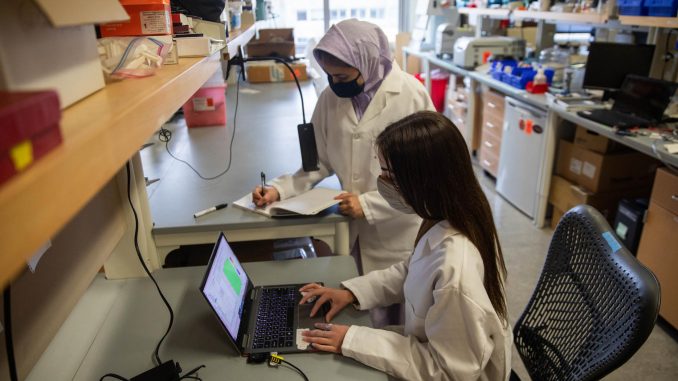
Professors Irina Mitrea and Nancy Pleshko solve intricate equations and research complex scientific phenomena, but they hope their legacy will be the doors they open for other women in science, technology, engineering and math.
The work of female-identifying faculty and students in Temple University’s STEM programs is creating new research methods, earning them accolades in the science community and advancing scientific expertise. In light of Women’s History Month, women faculty and students in STEM highlight their success, which can be overshadowed by advantages men often experience in these historically male-dominated fields.
Fifty percent of women in STEM jobs have experienced gender discrimination at work, according to a 2018 report from the Pew Research Center. Although total STEM jobs increased by 79 percent since 1990, women’s positions in fields like mathematics, computer science and engineering have stayed about the same or decreased.
While earning her bioengineering doctorate at Rutgers University in the 1980s, a male peer told Pleshko to wash all the glassware their group used during labs, a remark she views as unacceptable today. Yet, she notices female STEM students are still often viewed as less talented than their male peers, she said.
“As a trainee in someone’s lab, as a female, are you going to be equally considered for jobs, even if your work is just as good? Are you going to be as equally considered as a male scientist?” said Pleshko, a bioengineering professor. “You really have to push yourself.”
Although women enter higher education programs at a higher rate than men, they only earn 36 percent of STEM bachelor’s degrees and only hold one in four STEM jobs in the United States, according to a 2020 study by the University of California, San Diego, despite making up the majority of the workforce.
As faculty, Pleshko and others in the College of Engineering are dedicated to encouraging their female-identifying students and supporting their research, she said.
“We just really, really like to help give those students a little push, you know, and a little confidence if they need it to say, ‘Yes, you can do, you know, you can do this, and just as well, or better than anybody else,’” Pleshko added.
Alyssa Veneziale, a junior health professions major, said working in Pleshko’s lab helped her gain confidence as a woman in STEM. Veneziale researches brittle bone disease, something she would not have been able to do without Pleshko’s support, she added.
“I’ve never felt as at home like I do in Dr. Pleshko’s lab,” Veneziale said. “Like just our little tiny group of 11 is so diverse … There’s like four girl undergrads and I would never expect that because it’s just like not how science normally pans out.”
Sakina Bookbinder, a senior bioengineering major, has worked in Pleshko’s lab since her freshman year doing data acquisition and processing for students’ research projects.
Bookbinder uses techniques she learned from Pleshko in her own research, including studying chemical bonds in biomaterials and the makeup of proteins, she said.
“Through her lab and also with her encouragement, I’ve had the ability to learn a lot, like a huge diverse range of skills that I don’t know how I would have learned otherwise,” Bookbinder said.
Mitrea, a math professor and chair of the math department, is the first female Laura H. Carnell professor in the College of Science and Technology. She earned the title, one of the highest honors for Temple faculty making outstanding contributions to their department, in July 2020.
Mitrea’s love for math began in her childhood home in Urziceni, Romania, with a mother who taught geography but “was fascinated with mathematics” and encouraged math discussions, she said.
At the University of Bucharest in Bucharest, Romania, where she earned her undergraduate degree in mathematics, Mitrea had a close group of female friends who are now math professors at universities across the world, she said.
“We sort of created this group that felt extremely supportive but it also had this professional angle,” Mitrea said. “Everyone was determined to succeed at some level.”
But Mitrea still notices how few women and people of color are at the conferences she attends and in classes she teaches, she said.
“I think that many times women shy away from mathematics because there is a perceived sense of, ‘I don’t belong here,’” she added.
In 2011, Mitrea hosted the first Sonia Kovalevsky Day at Temple, created to encourage middle school girls to pursue their interest in STEM.
Mitrea hopes her outreach work and success as a mathematician will help other women in STEM get the same recognition as their male colleagues, she said.
“I have a big deal of hope in the younger generation of women,” Mitrea said. “I am so enthusiastic to see them standing up for what is right and for what they deserve.”


Be the first to comment